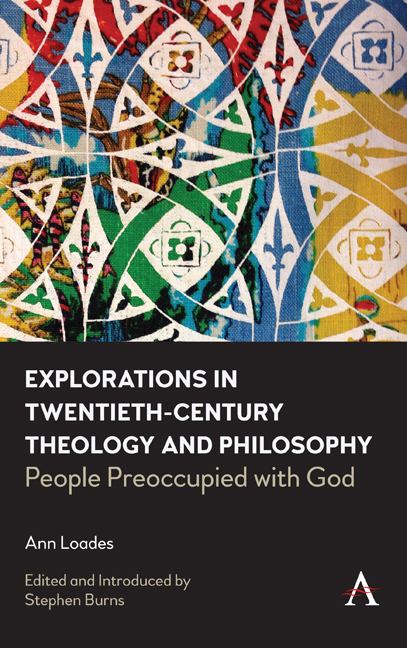Book contents
- Frontmatter
- Contents
- A Personal Note
- Foreword
- Introduction: The Grace of Intelligence
- Chapter One Evelyn Underhill (1875–1941): Mysticism and Worship
- Chapter Two Evelyn Underhill: As Novelist – Exploring Mysticism
- Chapter Three Dorothy L. Sayers (1893–1957): War and Redemption
- Chapter Four Dorothy L. Sayers: Are Women Human? Considering Dante’s Beatrice
- Chapter Five C. S. Lewis (1898–1963): On Gender
- Chapter Six C. S. Lewis: On Grief
- Chapter Seven Austin Farrer (1905–1968): Love Almighty and Ills Unlimited
- Chapter Eight Austin Farrer: And Friends
- Chapter Nine Simone Weil (1909–1943): Resistance and Writing
- Chapter Ten Simone Weil: Eucharistic Sacrifice – Exploring a Metaphor
- Chapter Eleven Stephen Sykes (1939–2014) and Colleagues: Exploring the Problematic Legacy of Power
- Afterword: The Passionate Intellect of Ann Loades
- Acknowledgements
- Bibliography
- Contributors
- Index
Chapter Eleven - Stephen Sykes (1939–2014) and Colleagues: Exploring the Problematic Legacy of Power
Published online by Cambridge University Press: 18 November 2023
- Frontmatter
- Contents
- A Personal Note
- Foreword
- Introduction: The Grace of Intelligence
- Chapter One Evelyn Underhill (1875–1941): Mysticism and Worship
- Chapter Two Evelyn Underhill: As Novelist – Exploring Mysticism
- Chapter Three Dorothy L. Sayers (1893–1957): War and Redemption
- Chapter Four Dorothy L. Sayers: Are Women Human? Considering Dante’s Beatrice
- Chapter Five C. S. Lewis (1898–1963): On Gender
- Chapter Six C. S. Lewis: On Grief
- Chapter Seven Austin Farrer (1905–1968): Love Almighty and Ills Unlimited
- Chapter Eight Austin Farrer: And Friends
- Chapter Nine Simone Weil (1909–1943): Resistance and Writing
- Chapter Ten Simone Weil: Eucharistic Sacrifice – Exploring a Metaphor
- Chapter Eleven Stephen Sykes (1939–2014) and Colleagues: Exploring the Problematic Legacy of Power
- Afterword: The Passionate Intellect of Ann Loades
- Acknowledgements
- Bibliography
- Contributors
- Index
Summary
My narrative is concerned with some elements in Anglican theology over the last halfcentury or so, and with their wholly unforeseen legacy for the credibility of those who represent and wish to commend Christian tradition. I have chosen to provide a thread of connection through my narrative by referring to the work of Stephen Sykes, a near contemporary, whose concern throughout his career was to commend the integration of specifically Church of England liturgy and theology. A distinctive characteristic of his perspective was his confidence in the theological competence of the laity given the episcopate as ‘authorised interpreters’ of the resources they had inherited and faithfully transmitted. My overall proposal is that whatever the theological and liturgical competence of at least some members of the episcopate, their failure to address themselves to much-needed change in the very structure of relationships in the church has put in jeopardy the trust in its representatives on which its members should be able to rely and indeed enjoy.
Introducing the Thread of Connection
I begin with an initial introduction to the life and work of Stephen Whitefield Sykes, for a decade a colleague in the University of Durham's Department of Theology, and a lifelong contact in friendship thereafter. Stephen Sykes was born in 1939 into a clerical family then based at a Bristol college for the training of Church of England candidates for ordination. His secondary education began at Bristol Grammar School, but he was sent from there to what was then an all-boys school in Bath, graduated from St John's College, Cambridge in Theology, and trained for ordination at Ripon Hall, Oxford. Ordained deacon in 1964, he returned to Cambridge as dean of his Cambridge College, and was made priest in the following year. A stint as an assistant and then a full lecturer led to his becoming Van Mildert Canon of Durham Cathedral and professor in the university's Department of Theology (1974–1985). It was during that decade that he identified some of the central preoccupations of his theology. He left Durham to become Regius Professor of Divinity in the University of Cambridge for just five years, becoming bishop of Ely 1990–1999, thence back to Durham as principal of St John's College until retirement in 2006 – the year of the publication of his concluding and controversial ref lections on ‘power’.
Information
- Type
- Chapter
- Information
- Explorations in Twentieth-Century Theology and PhilosophyPeople Preoccupied with God, pp. 161 - 214Publisher: Anthem PressPrint publication year: 2023
